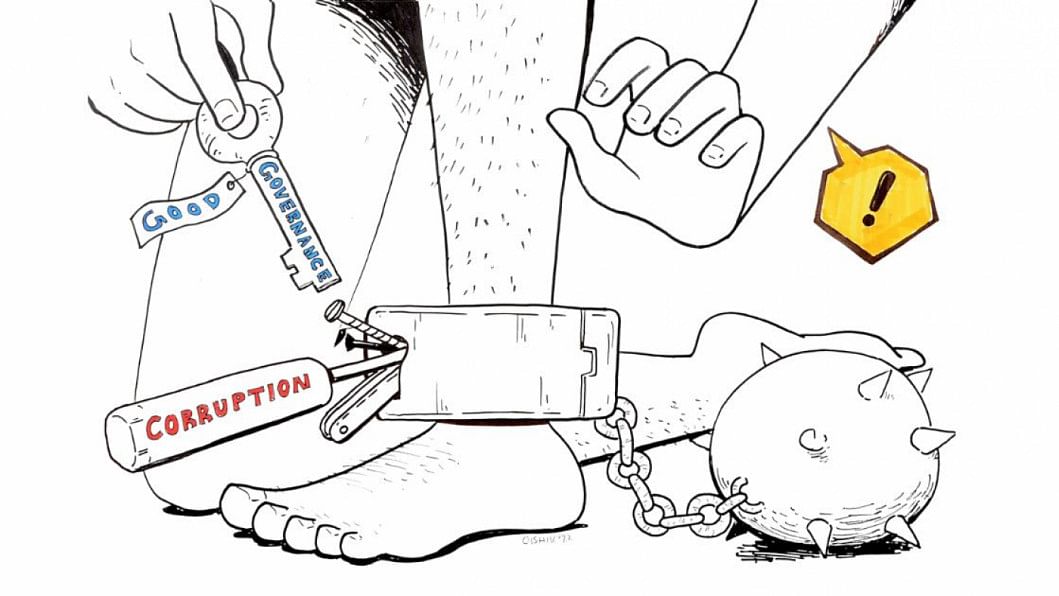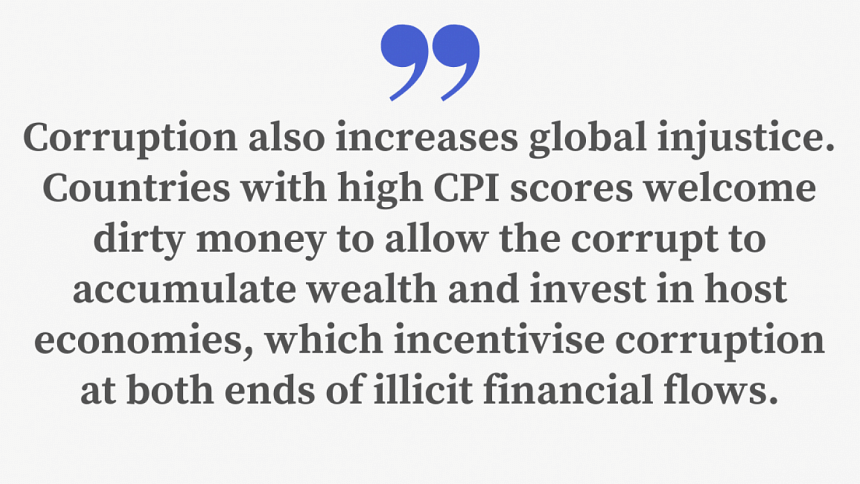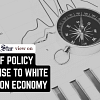CPI 2022: Disappointing global and Bangladesh performances

The Transparency International (TI) released its Corruption Perceptions Index (CPI) 2022 on January 31. Compared to 2021, the overall situation in Bangladesh and globally have worsened. Scores have improved for 49 countries out of 180 compared to 65 in 2021, declined for 73 compared to 66, and remained the same for 58 compared to 48. Countries that have scored lower compared to 2021 include some of the top scorers. As many as 123 countries (68.3 percent) have scored below 50, which indicates "serious corruption problem," while 104 countries (57.7 percent) are in a more grave situation, scoring below the global average of 43.
Bangladesh has scored 25, the 12th global lowest score and position, and remains second lowest in South Asia, above only Afghanistan. The score is lower compared to 2021, 2020, 2019 and 2018. Counted from the top, Bangladesh retained the same 147th position as 2021. Bhutan continues as the best in South Asia, scoring 68. In the rest of the region, scores remained well below the global average: India and Maldives with 40, Sri Lanka 36, Nepal 34, Pakistan 27, and Afghanistan 24.
The trend analysis for 2012-2022 shows that Bangladesh has lost one point and Sri Lanka two. Afghanistan has gained 16 points, Bhutan six, India four, Maldives four (2017-2022), Nepal seven, and Pakistan unchanged. Bangladesh is the third lowest among 31 Asia-Pacific countries, better than only Afghanistan (24), Cambodia and Myanmar (23), and North Korea (17). If the current trend continues, Bangladesh faces the possibility of descending to the very bottom in South Asia.
Denmark, with a score of 90, has topped the list, followed by Finland and New Zealand (87), Norway and Singapore (84), Sweden (83), Switzerland (82), Netherlands (80), Germany (79), Ireland and Luxembourg (77), Hong Kong (76), Australia (75), Canada, Estonia, Iceland and Uruguay (74), and Belgium, Japan and the UK (73).

The US scored 69, which remains inconsistent with its perceived global influence. China (45) and Russia (28) continue to be low performers. Somalia scored the lowest global score of 12, followed by South Sudan and Syria (13), Venezuela (14), Yemen (16), Burundi, Equatorial Guinea, Haiti, Libya and North Korea (17), and Chad, Comoros, Nicaragua and Turkmenistan (19).
In addition to scores and ranks, CPI 2022 also shows how corruption, conflict and insecurity are interrelated and feed each other, which creates a vicious circle. Corruption leads to deprivation, discrimination and injustice, which create social tensions. By eroding trust and legitimacy of the government, such tensions often lead to violent conflicts, as in some lowest-ranking countries.
Corruption-related protest movements are often violently suppressed by law enforcement institutions, many of which are also affected by corruption. As many as 130 countries have seen significant social protests since 2017, of which 42 percent were related to corruption. About 80 percent of the corruption-related protests happened in countries with CPI scores below 50. About 82 percent of the documented violent government responses against protesters also occurred in countries with CPI scores below 50. Some high-scoring countries also experienced such protests.
While some at the top of CPI 2022 have scored somewhat higher than those in 2021, like Denmark, Australia and the US, or some maintained the same score as the previous year, for the majority, the score worsened. Finland, New Zealand, Norway, and Germany lost one point each, Sweden, Switzerland, Netherlands and Singapore two, Luxembourg four, and the UK lost five. Many high-scoring countries have witnessed notable decline in their score not only compared to 2021, but also over a longer term. During 2012-2022, Australia and Canada marked a 10-point decline, Sweden five, Netherlands, Singapore, Switzerland and US four, Finland, Luxembourg and New Zealand three, Belgium two, and Japan and the UK one.
Corruption also increases global injustice. Countries with high CPI scores welcome dirty money to allow the corrupt to accumulate wealth and invest in host economies, which incentivise corruption at both ends of illicit financial flows.
The failure of high scorers to walk the talk is no justification for Bangladesh's continued failure to improve. This time, it is particularly frustrating because the CPI 2022 data period (November 2019-September 2022) was supposed to be one of zero tolerance against corruption. In reality, it witnessed no concrete strategic action to translate the rhetoric into practice. Public sector corruption, often in collusion with the private sector, deepened and widened around Covid response programmes, public contracting and distribution. The period also saw endless exposure of money laundering with hardly any effective action.
The deficit of effectiveness of the Anti-Corruption Commission (ACC) and other relevant authorities to set examples of corruption being punishable, especially for the "big fish," continued together with the weakening of state institutions by political and bureaucratic influence. Accountability procedures in public services continued to be ineffective, while there were examples of backlash for action against corruption that sent out the wrong message that abuse of power, breach of integrity and violation of laws are protected, even rewarded. Political and government positions continue to be indiscriminately abused. No concrete measures were taken to salvage the banking sector ravaged by loan default, financial fraud and money laundering. Media and civil society space is under further intimidating surveillance, intolerance and reprisal for disclosure and reporting on corruption.
Going forward, impunity must be challenged to effectively bring the corrupt – especially the powerful – to justice, irrespective of status or identity. State institutions must be freed from partisan political and bureaucratic influence. Professional expertise, integrity and impartiality of ACC, public service, administration and law enforcement agencies must be upgraded.
To salvage the banking sector, institutional and legal provisions must be created with a particular focus on transparency and accountability. These include Common Reporting Standard for automatic sharing of data on financial transactions, beneficial ownership transparency, and mechanism to address conflict of interest.
Measures for robust disclosure of information, wider and deeper digitalisation of public services, and financial transactions can enhance the capacity to prevent and control corruption. The government must realise that the other name for restricting space for media and civil society is protection and promotion of corruption. A paradigm shift is needed in political and governmental culture to stop using political and public positions as the licence to abuse power.
Dr Iftekharuzzaman is executive director at Transparency International Bangladesh (TIB).

 For all latest news, follow The Daily Star's Google News channel.
For all latest news, follow The Daily Star's Google News channel. 










Comments